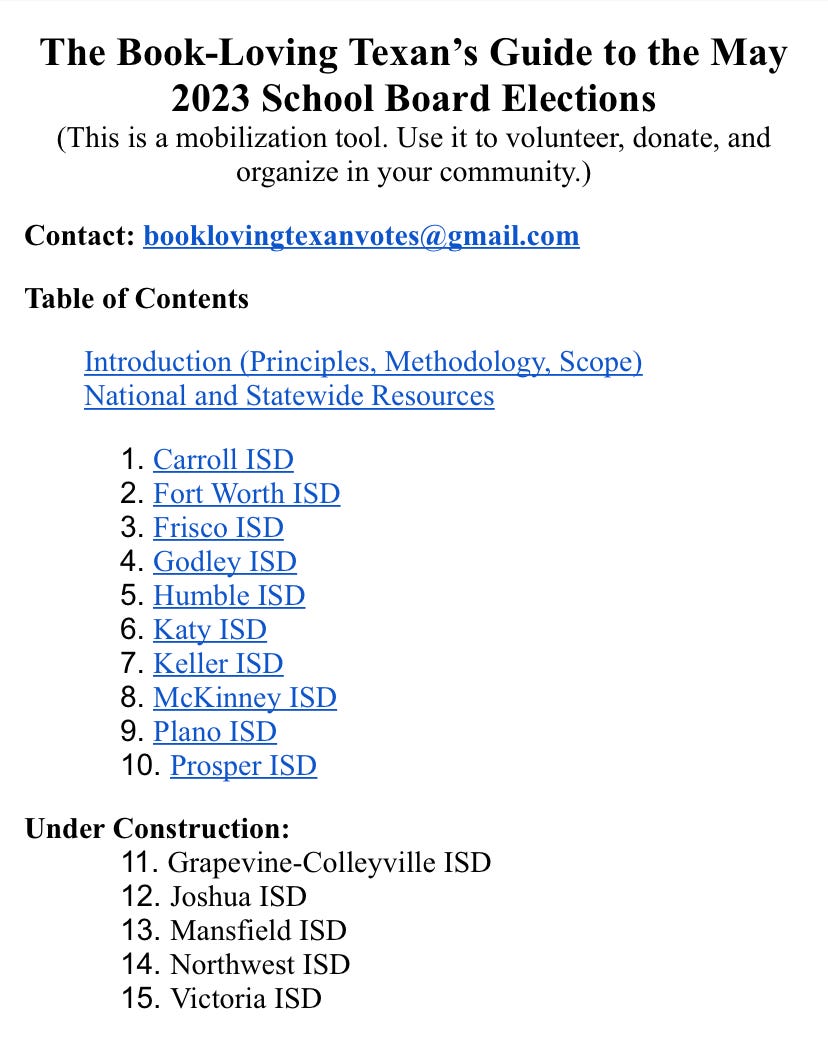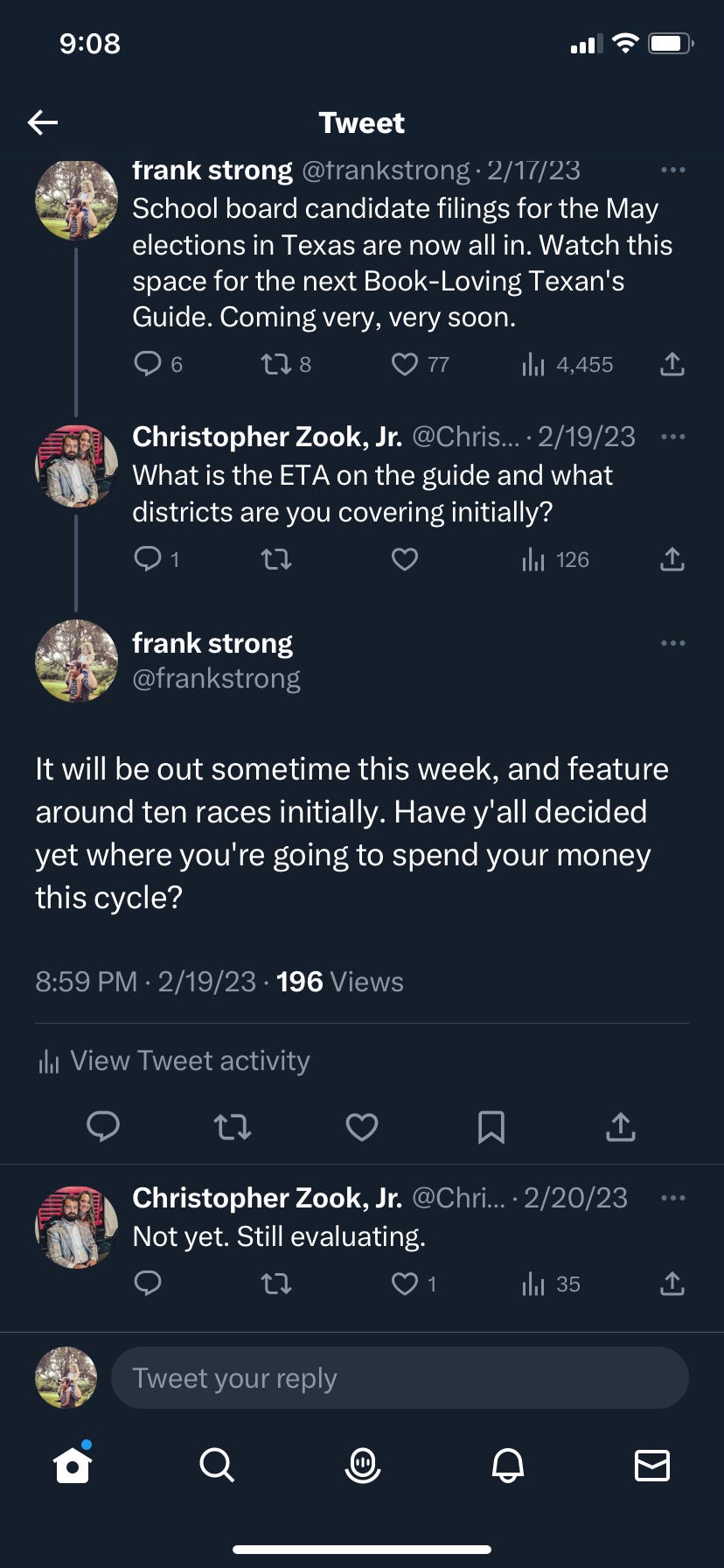The Book-Loving Texan's Guide to School Board Elections Is Up!
This is just a quick note to let you know that I just posted the third edition of The Book-Loving Texan’s Guide to School Board Elections. Please read it to get a handle on the candidates running for trustee in Texas in May’s election. I’ve started with ten districts, but already have plans to add at least five more. And my inbox is always open, so please let me know if there’s a district I need to feature.
In the next few weeks, I’ll be profiling some noteworthy races from the document, but for today I want to just point you to a few highlights and key takeaways.
Fun Candidate #1: Rachel Elliott (McKinney ISD)
You may have heard last year about the couple in McKinney who tried to challenge nearly 300 books in the district all at once. If you didn’t, here’s the basic story: Paul and Rachel Elliott, who show up to most district board meetings to harangue the board about library books, seem to have cross-listed Matt Krause’s infamous 800+ book list with the MISD catalogues, and found that the district held 282 of the titles on Krause’s list. Those 282 books included Raina Telgemeier’s Drama, Isabel Wilkerson’s Caste, Jerry Craft’s Class Act, And Tango Makes Three, and Between the World and Me by Ta-Nehisi Coates.
District policy at the time required challengers to read the books they were challenging. The Elliotts said they did, but they copied and pasted the same generic complaint for all 282 books:
Contains one or more of the following: Marxism, incest, sexual explicit material—in written form and/or visual pictures, pornography, CRT, immoral activities, rebellious against parents, and the material contradicts the ISD’s student handbook.
The challenges were dismissed out of hand. But McKinney policies were recently changed to no longer require challengers to read books in their entirety. And Rachel Elliott is now running for a seat on the board.
Fun Candidate #2: Lydia Ortega (Plano ISD)
Look. After doing this research for three election cycles, I'll admit it: sometimes this gets boring. It’s like, Yeah, yeah, yeah, another board meeting with an angry parent reading the same out-of-context passage from The Bluest Eye or Perks of Being a Wallflower. Or, yeah, yeah, yeah, Whoever purchased these books should be put in jail, yada, yada, yada. Or, Oh, look, a parent reading the Bible passage about the millstone around the neck—haven’t heard that one before.
But Plano ISD has at least one candidate who made a suggestion at a recent board meeting that I had never heard before: Let’s pay students, she said, to find the dirty passages in library books.
I’m not kidding! At the October 2021 Plano board meeting, Ortega read an out-of-context passage from a Lauren Myracle book (yawn). But then, “since constant book monitoring and review is costly,” Ortega proposed the district “incentivize” students to find sexual language in the library by rewarding them with $500 for turning the books in to the authorities. “I think that’s a way to cull this material and to ensure that the costs aren’t borne by the staff and the faculty,” she said.
As I said in the document, that is a great way to teach students Shakespeare. Elizabethan English can be hard to parse, but promise students that kind of cash and you can bet they’ll find all the dirty phrases and jokes in Romeo and Juliet faster than you can say “My naked weapon is out.”
Actually Amazing Candidate: Haley Taylor Schlitz (Keller ISD)
One phenomenal candidate I learned about in the course of my research is Haley Taylor Schlitz, who’s running against John Birt for Place 4 in Keller ISD. Here’s what I wrote about her in the doc:
Haley Taylor Schlitz graduated from Texas Woman’s University at 16, then SMU’s Dedman Law School at 19. As her personal website puts it, Taylor Schlitz was “the youngest Black American to ever graduate from law school in the history of the United States,” and her academic achievements have been covered by a number of media outlets.
As an advocate, she has focused on standing up for a wide range of student groups, with a special focus on minority gifted and talented students. At TWU, she organized to provide support for DACA students.
For good measure, in 2020 Taylor Schlitz was crowned Miss Keller and Miss Tarrant County Outstanding Teen and was celebrated by Beyoncé. (No word yet on Beyoncé’s opinion of John Birt)
At the August board meeting, Taylor Schlitz gave an impassioned speech that called the district’s book-banning moves “malpractice and unconstitutional” and blasted the “misguided attempt by some of you to harm the intellectual curiosity and freedom of students.” “Besides embarrassing all of Keller with this misguided decision,” she said, “you are doing serious harm to the educational opportunities of the future generations we will need to ensure a conscious, strong, and successful community.”
Her whole speech is worth watching. It starts at 3:01:17.
She’ll face an uphill battle in a district that has been dominated by pro-censorship candidates. And she’ll probably face moneyed opposition from KISD Family Alliance and, likely, Patriot Mobile Action PAC.
New Problem: Hostile Eyes
Speaking of big money, as the circulation of The Book-Loving Texan’s Guide grows, more and more people who are not on board with the guide’s project are going to see it. Before I published this edition, I was contacted several times by the president of Texans for Educational Freedom, a pro-voucher group that spends heavily in Texas political races. Last fall, they poured money for ads into the races in Leander and Conroe ISD, two districts I covered extensively.
It’s disconcerting, but, ultimately, once you put information out into the public realm you can’t control what people do with it. I just try to be responsible with what I share.
Key Takeaway: They’re (Almost) All Republicans
One thing hostile readers of my doc have tried to do in previous cycles is paint the project as a tool of the Democratic Party, or paint the candidates I give green highlights as “socialists,” “Marxists,” or “leftists.”
To get in front of that this year, I added the extra research step of looking up the primary voting history of every candidate I covered. Guess what? Outside of the cities and diverse inner-ring suburbs (like Arlington), they’re almost all Republicans. The people I gave green highlights, the people going up against book banners? Mostly Republicans.
The point is that the line that divides my evaluations isn’t partisanship, it’s principles. And people of both parties can agree that neither censorship nor fear-mongering is an American value.





